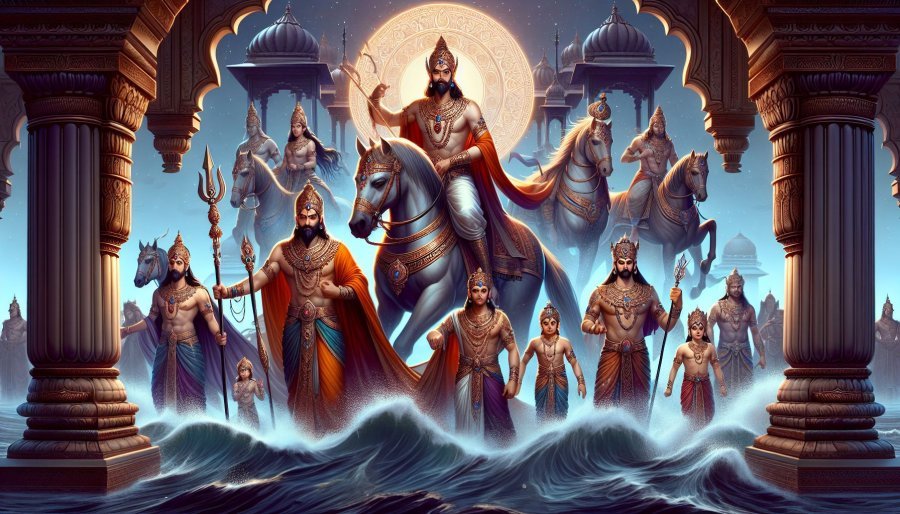Section XCV - History of Ancestors: Descendants of Puru and the Pandavas
Book index: Mahabharata (English)
This page contains a summary of the Mahabharata Section XCV including examples of moral lessons in daily life. The Maha-Bharata is one of the largest epics ever written containing roughly 100,000 Sanskrit verses. It deals with the legendary history of ancient India and contains a large number of interwoven tales.

Short summary of the chapter:
The great history of Janamejaya's ancestors, starting from Manu, reveals the lineage of monarchs who ruled with wisdom and virtue. The lineage continues with Puru, who had a son named Janamejaya. Janamejaya's son, Prachinwat, conquers the eastern regions, and the dynasty continues through generations like Ayutanayi, Akrodhana, and Matinara. The lineage eventually leads to Tansu, who marries Ilina's daughter and begets the famous Bharata, who founds Hastinapura.
Bharata marries Sunanda and begets Bhumanyu, who marries Vijaya and has a son named Hasti, the founder of Hastinapura. Hasti's descendants lead to Ajamidha, who has many sons, including Samvarana, the perpetuator of the dynasty. Samvarana marries Tapati and has Kuru, who marries Subhangi and begets Viduratha. Viduratha's son, Anasvan, marries Amrita and has Parikshit, the father of Bhimasena.
Bhimasena marries Kumari, and their son is Pratisravas, who marries Sunanda and begets Pratipa. Pratipa marries Sivi's daughter, Sunanda, and has three sons - Devapi, Santanu, and Valhika. Santanu marries Ganga and begets Bhishma, while his second wife, Satyavati, has two sons, Dhritarashtra, and Pandu. Pandu, having children through Kunti and Madri, gives birth to Yudhishthira, Bhima, Arjuna, Nakula, and Sahadeva.
The Pandavas face various challenges but eventually marry and have children. Yudhishthira has Prativindhya, Bhima has Sutasoma, Arjuna has Srutakriti, Nakula has Satanika, and Sahadeva has Srutakarman. Bhimasena also has a son named Ghatotkacha with Hidimva. Abhimanyu, born to Arjuna and Subhadra, marries Uttara and has Parikshit, who becomes a great king. Janamejaya, son of Parikshit, marries Vapushtama and has Satanika and Sankukarna, who continue the royal lineage.
Full English translation:
This page is merely a summary which is automatically generated. If you are looking for authentic sources such as the Sanskrit text or the Full English translation of Mahabharata Section XCV - History of Ancestors: Descendants of Puru and the Pandavas, have a look at the following articles:
Section XCV, online text
English translation by Kisari Mohan Ganguli.
Read this and other chapters online.
Mahabharata (English Summary)
by Kisari Mohan Ganguli | ISBN-10: 8121505933
Buy the latest edition:
FAQ of Mahabharata, Section XCV:
Who were the prominent ancestors in the royal lineage?
The royal lineage includes Manu, Ha, Pururavas, Yayati, and many more illustrious monarchs. They were known for their wisdom, virtue, and prowess.
How did the Pandavas overcome challenges?
The Pandavas faced various trials, including attempts on their lives and exile, but their determination, virtue, and familial support helped them prevail.
Why was Parikshit named so?
Parikshit was named by Vasudeva, as he was born in an extinct race and was revived by divine intervention, giving him strength and prowess.
What virtues are associated with listening to the Bharata story?
Listening to the Bharata story brings great religious merits, respect from both gods and humans, and the conquering of heavens.
Who was Abhimanyu and Uttara's son?
Abhimanyu and Uttara's son was named Parikshit, who was revived by Vasudeva and endowed with strength, energy, and prowess.
What is the significance of the Bharata story for different social orders?
The Bharata story should be listened to with reverence by Brahmanas, Kshatriyas, Vaisyas, and Sudras, as it bestows wealth, fame, and life.
Daily life: History of Ancestors: Descendants of Puru and the Pandavas:
The story from the Indian epic Mahabharata, as recounted above, weaves a complex tapestry of characters, actions, and consequences, illustrating fundamental virtues and teachings that can be applied to daily life. At the heart of these narratives are the ideas of duty, virtue, and the importance of righteousness, which hold timeless relevance.
One key lesson is the significance of fulfilling one's duties and responsibilities with integrity and honor. The characters in the story, through their various trials and tribulations, underscore the importance of adhering to one's dharma or moral duty, regardless of the challenges faced. This principle can be integrated into daily life by committing to our roles, whether as family members, professionals, or citizens, with dedication and ethical conduct.
Another important aspect highlighted is the power of forgiveness, compassion, and the relentless pursuit of justice. The narrative shows that while conflict and injustice may be part of human experience, striving for resolution and fairness leads to peace and harmony. Thus, in our interactions, being empathetic and just, and seeking to resolve disputes amicably, can create healthier relationships and communities.
Furthermore, the story emphasizes the significance of perseverance and resilience. Characters who face adversity with courage and determination eventually overcome their obstacles. This teaches us that in facing life's challenges, staying steadfast and resilient, anchored by our values, can lead us to triumph.
The tale also celebrates the virtues of loyalty, love, and respect among family and friends, highlighting how these bonds can provide strength and support in times of need. Therefore, nurturing and valuing our relationships, and being there for others, can enrich our lives and provide a vital support system.
Lastly, the narrative illustrates the concept of karma, or the belief that our actions have consequences. It invites us to live conscientiously, making choices that contribute positively to our lives and the world around us. By acting with awareness of the impact of our deeds, we can steer our lives towards a more fulfilling and righteous path.
In essence, the epic's stories, while set in a time and context far removed from our own, offer universal principles for leading a life of virtue, purpose, and integrity. By embodying these values in our daily lives, we can navigate the complexities of the modern world with wisdom and grace.
